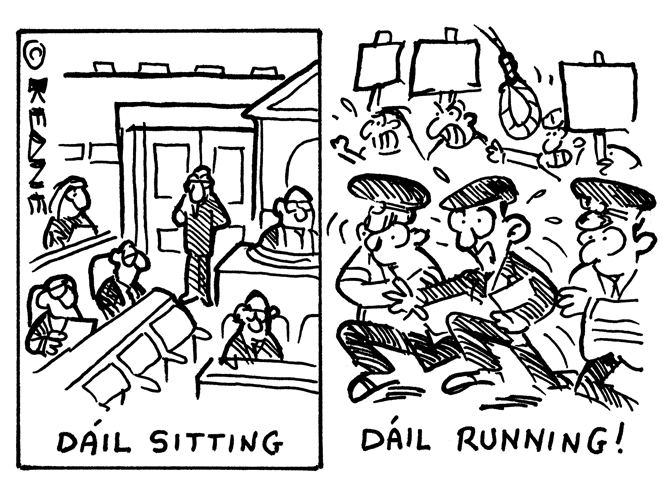
Mary Lou McDonald
THE FIRST line of defence from the Government and its Greek chorus in the media against the increasing likelihood of Sinn Féin coming to power is that the combined poll rating of the Government parties is still greater than that of SF. The second is that even if they come to power, SF will have to compromise with another party or parties. Both positions indicate that ministers and their dutiful messengers are still in denial about the threat from the SF Visigoths and how it will soon be too late to avoid a sacking of the city.
Two dismal sets of poll figures for Fianna Fáil and Fine Gael in the last week show that SF is back in the mid-30s percentage wise after a brief period in the early summer when Mary Lou McDonald’s party was in the low 30s, giving rise to gleeful predictions of SF’s downward slide. Last week the penny appeared to finally drop with political correspondents that SF could be slightly suppressed temporarily – the Hutch trial, slippage of a few points to the far right etc – but the main trend continues to be upwards for SF.
This is when the second line of defence against the barbarian forces was erected. Irish Times political editor Pat Leahy’s analysis was headlined, “Sinn Féin will have to compromise if McDonald is to make history”. There followed an assessment of how SF and FF would react to each other in any coalition discussions.
There also followed an interesting article in the Sunday Independent from TD Richard Boyd Barrett of the Socialist Workers Party – aka People Before Profit – who demanded implementation of a 10-point programme to be adopted by SF and others on the left, and the rejection of any SF deal with FF or FG.
PBP currently enjoys 2% circa on average in recent polls. (That the SWP’s comprehensive programme on housing, health, cost of living etc did not include a word about the north will have been clocked by SF and others). The TD cited Labour’s self-defeating deals with FF/FG as something to be avoided.
Both Leahy and Boyd Barrett miss the point about the restraining influence of FF or others on the centre-right. Labour’s repeated deals with FF and FG were in coalitions in which Labour was always the minor party. Leahy and Boyd Barrett must surely know that this time FF will be in Labour’s weak, junior, coalition position and that it is Mary Lou, not Micheál Martin, who will decide the main parameters of any joint programme.

Micheál Martin
There is one issue that everyone, including SF, has failed to point out and that is the possibility, perhaps remote, that Sinn Féin may not need the support of any party to form a government. But the 2020 general election had lessons for all the parties, if they care to notice them.
The first of these was that the deliberate depiction by SF of the two right-of-centre parties, FF and FG, as ganging up to prevent change via SF worked wonderfully during the election campaign. It also worked, if only in the polls, after the election when the ‘establishment’ (FF/FG, media etc) were seen as preventing the country’s most popular party, SF, from coming to power.
Now that SF is on the rise again, the quiet mutterings from FF and FG leaders about a united front of the centre right keeping SF at bay is getting louder. This is not clever politics as it enraged younger voters in particular last time and will likely anger them even more this time round.
Also, the IT prediction in the 2020 election was that SF’s high poll ratings would decline once the serious business of the election campaign developed. The 2016 election was cited as an example given that SF began it with 21% and finished on 16% circa a week before polling day. However, in 2020 the opposite happened and SF began on 19% at the start of the campaign and soared to 25% a week before election day, taking 24.5% of the vote on the day – a proportionate rise of 29% in three weeks. If anything like that happens this time…
This trajectory in 2020 was a direct result of a new, angrier mood and a surge in favour of change that overwhelmingly benefited SF. This time, it looks as though SF will enter the election on around 35% and the anger against the establishment politicians is even stronger than in 2020. This means another surge is even more likely than in 2020 and it is hard to see anyone but Sinn Féin seriously benefiting from it when the time comes to form the next government.
The local elections are likely to hammer home these trends, especially as FF in particular overperformed in 2019 while SF seriously underperformed. No wonder the other whispered conversation in Leinster House and Government Buildings is whether or not to hold an early general election before things get out of hand altogether.
















